The second Meeting of States Parties to the Treaty on the Prohibition of Nuclear Weapons (TPNW) took place in New York at the end of 2023. The treaty expresses concern about the humanitarian consequences of the use of nuclear weapons and calls for the complete destruction of nuclear weapons. No NWS or US ally are signatories to the TPNW. Israel possesses at least 200 nuclear weapons and opposes making the Middle East a Nuclear-weapon-free zone (NWFZ).
Heinz Gärtner
5 February 2024
French version | Russian version
The Second Meeting of States Parties to the Treaty on the Prohibition of Nuclear Weapons (TPNW) took place in New York from 27 November to 1 December 2023. From the organizers’ point of view, it was quite successful.
The treaty expresses concern about the humanitarian consequences of the use of nuclear weapons and calls for the complete destruction of nuclear weapons. It entered into force in January 2021 and achieved 93 ratifications and 69 signatories by the time of the conference. That is a total of around three quarters of the world’s states.
Nuclear deterrence dominates the thinking of the security establishment
In fact, there is a deep mistrust between nuclear weapon states (NWS) and non-nuclear weapon states (NNWS). The NNWS gave up their right to develop and possess nuclear weapons when they joined the Nuclear Non-Proliferation Treaty (NPT). They thought this would be a way to avoid becoming a primary target in a nuclear conflict.
The NNWS feel that they have been cheated. They have renounced the possession of nuclear weapons by joining the NPT; however, the NNWS feel that the NWS have not honored their commitment to seriously negotiate complete disarmament as required by Article VI of the NPT. They therefore called for a legally binding ban, which the TPNW represents.
The diplomatic efforts of the States Parties to abolish nuclear weapons have created a norm contrary to the NWSs, namely disarmament instead of deterrence. Nevertheless, the NWS narrative dominates the opinion of the political elites in the NWSs and their allies. No NWS nor any state allied with them support the TPNW, since NATO sees itself as an alliance based on nuclear deterrence.
There can only be a world free of nuclear weapons if the dogma of nuclear deterrence is abandoned. There is no sign that the international security establishment is prepared to do so. At the EU conference in Brussels from 4 to 5 December 2023, entitled “Non-proliferation and Disarmament”, the central theme was “Defense and Deterrence” and not arms control and disarmament.
The logic of deterrence is based on a strange paradox. One assumes that the opponent rationally adheres to this logic, but assumes at the same time the irrationality of an intention to attack. In any case, nuclear weapons have not prevented conventional wars. The wars in Korea, Vietnam, Falkland-Argentina, India against Pakistan and those against Israel in 1973 and 2023, as well as the Ukrainian resistance against the nuclear power Russia, are some examples of this. Nevertheless, North Korea, India and Pakistan believe they can use their nuclear weapons to prevent attacks with conventional weapons.
Nuclear Deterrence and Nuclear Warfare
There has certainly been a reduction in the number of nuclear weapons since the end of the Cold War. However, the NWS have violated Article VI of the NPT by permanently modernizing their nuclear weapons. This modernization is entirely consistent with the security logic of nuclear weapons.
Deterrence is not the sole purpose of nuclear weapons. If nuclear weapons are to be useful, they must also be useable. If they cannot be used, they are not a credible deterrent. This inevitably turns nuclear weapons into weapons of warfare. Smaller nuclear weapons make deterrence more credible, but also make their use more likely. This principle already applied to NATO’s “flexible response” strategy in the 1970s, when it was realized that a threat of massive mutual destruction was not credible. To believe that a nuclear confrontation can be limited is a seductive but unreal assumption. There is no study that can prove that nuclear war can be limited.
Nuclear weapons do not necessarily make NWS and their allies safer, as they assume. On the contrary, NWS and their allies are the first target countries for other NWS. As in the Cold War, this could be the European countries. The large nuclear weapon states, the USA and Russia, could try to spare their large cities in the event of a nuclear war and limit the war to Europe with smaller nuclear weapons. The 1987 Intermediate-Range Nuclear Forces Treaty was intended to prevent this, but was terminated by President Trump in 2018. An escalation of the war in Ukraine harbors this danger again.
Extended Deterrence and Nuclear Coercion
Added to this is the principle of extended deterrence. The allies of the NWS, such as NATO members, South Korea and Japan, rely on the NWS promise that nuclear weapons will be used in the event of an attack on allies (“umbrella states”). However, the TPNW would contain the opposite promise, namely not to use nuclear weapons. Allies of NWS run the risk of becoming targets of nuclear weapons. But this promise is also a threat of suicide for the NWS, because they themselves could then become the target of a retaliatory strike.
Furthermore, NATO’s nuclear sharing would have to be ended if the US allies wanted to join the TPNW. The non-strategic nuclear weapons stored in various NATO countries (Belgium, Germany, Italy, the Netherlands and Turkey) would have to be withdrawn. The same applies to the Russian missiles stationed in Belarus.
Another reason for possessing nuclear weapons is that the mere threat of using nuclear weapons (“nuclear coercion”) can bring political advantages. Israel used its nuclear weapons, for example, to force the USA to take certain actions. In 1973, Israeli Defense Minister Moshe Dayan threatened to use nuclear weapons to force more military support from the USA. This indicates that Israel might also use this tactic in its current war in Gaza. It is no coincidence that the Israeli Minister of Culture Amihai Eliyahu raised this possibility in a radio interview in November 2023 stating that the nuclear option would be “one way” to deal with Gaza. Because of this leverage alone, Israel will not consider joining a Nuclear-weapon-free zone (NWFZ) in the Middle East.
The NWS will not move towards nuclear disarmament in the foreseeable future. The TPNW will therefore not achieve its goal of complete disarmament in the foreseeable future, even if its supporters radiate optimism.
All these arguments should not detract from the TPNW’s merit in having created a new system of norms as an alternative to the deterrence system, which also has a legal basis.
Picture: ‘Peace Begins with Her’ Interactive Street Art Exhibition at UN Headquarters, New York, 25 October 2023. © UN Photo/Loey Felipe
Other Articles Which Might Interest You
Nuclear Sharing and Other Challenges for the 2022 NPT Review Conference







